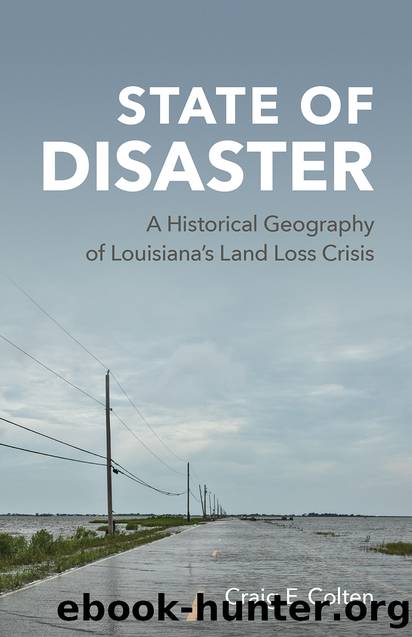State of Disaster: A Historical Geography of Louisiana's Land Loss Crisis by Craig E Colten

Author:Craig E Colten [Colten, Craig E]
Language: eng
Format: epub
Tags: Public Policy, Environmental Conservation & Protection, Political Science, Ecosystems & Habitats, Nature, Environmental Policy, Coastal Regions & Shorelines
ISBN: 9780807175705
Google: CYwpEAAAQBAJ
Goodreads: 57801507
Publisher: LSU Press
Published: 2021-10-20T00:00:00+00:00
Fig. 4.1. Louisiana waterways, 2020. Natural distributaries include Bayou Manchac, Bayou Plaquemine, and Bayou Lafourche. Map by Mary Lee Eggart.
This situation exposed both the value of the Atchafalaya as an outlet for floodwaters and the divergent interests of those who lived along the lower Mississippi and those who lived in the Atchafalaya Basin. Since the eighteenth century, powerful New Orleans interests have guided flood-protection efforts. During the colonial period, they deferred the cost of protection to rural planters. After statehood, parishes took primary responsibility for levee construction; later the state and levee districts assumed much of the responsibility; and in 1879, the federal government began a slow transition to develop a more consistent and federally financed levee system (Colten 2005, chap. 1). Securing additional financial support was central to the New Orleans flood-protection strategy, but displacement of risk also rose in importance. In the early twentieth century, deliberations about protecting New Orleans by diverting floodwaters down the Atchafalaya were a key point of contention.
During the second half of the twentieth century, with the Mississippi River largely confined between effective levees, hurricanes became the most perilous and uncontrolled risk, and the city secured federal assistance to erect barriers to hold back storm surge (Colten 2009). The biophysical impacts to the lower delta region from these dual efforts have been considerable. Starved of sediment, the delta is subsiding, and diversion of floodwaters to other locations produces episodic ecological disruptions. Thus, the decisions made to protect New Orleans have a regional impact. And currently, discussions about offsetting the rapid loss of coastal wetlands with land restoration projects have centered on displacing the environmental costs to those who live on the margins of the stateâs inhabitable land.
Historian Christopher Morris (2012) is one of several insightful scholars who have turned their attention to the Mississippi in recent years. While not focusing explicitly on the city-river relationship, he devotes considerable attention to the reworking of the vast wetlands created over the last fifteen thousand years by the Mississippi. Human endeavors over the past two centuries have persistently attempted to separate the river from swamps and marshes and make dry what was once wet. As Louisiana now turns its attention to restoring a small portion of the coastal wetlands, to counteract centuries of dewatering the floodplain, it faces strong opposition from coastal residents who have become acclimated to the conditions created by the reengineered lower delta. Natural resourceâbased activities are foundational livelihoods outside the city limits, and most fisherfolk can anticipate disruption of their current pursuits. Changes may come from the delivery of sediment that will bury oyster leases, which can be relocated, but at a cost. Addition of fresh water to the bays may alter salinity and drive bay shrimp and crabs farther from the small fishing ports and impose additional coasts on marginal fishing operations. Thus, those who have adapted to one set of transformations must consider how to adapt again. Meanwhile, those living behind the levees foresee little change, or perhaps are unwilling to
Download
This site does not store any files on its server. We only index and link to content provided by other sites. Please contact the content providers to delete copyright contents if any and email us, we'll remove relevant links or contents immediately.
The Lonely City by Olivia Laing(4799)
Animal Frequency by Melissa Alvarez(4462)
All Creatures Great and Small by James Herriot(4311)
Walking by Henry David Thoreau(3953)
Exit West by Mohsin Hamid(3824)
Origin Story: A Big History of Everything by David Christian(3687)
COSMOS by Carl Sagan(3618)
How to Read Water: Clues and Patterns from Puddles to the Sea (Natural Navigation) by Tristan Gooley(3466)
Hedgerow by John Wright(3354)
How to Read Nature by Tristan Gooley(3335)
The Inner Life of Animals by Peter Wohlleben(3311)
How to Do Nothing by Jenny Odell(3294)
Project Animal Farm: An Accidental Journey into the Secret World of Farming and the Truth About Our Food by Sonia Faruqi(3216)
Origin Story by David Christian(3195)
Water by Ian Miller(3179)
A Forest Journey by John Perlin(3069)
The Plant Messiah by Carlos Magdalena(2927)
A Wilder Time by William E. Glassley(2859)
Forests: A Very Short Introduction by Jaboury Ghazoul(2836)
